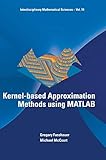Kernel-based approximation methods using MATLAB / Gregory Fasshauer and Michael McCourt.
Material type: TextSeries: Interdisciplinary mathematical sciences ; v 19.Publication details: Singapore : World Scientific, ©2016.Description: xviii, 518 p. : illustrations (some color) ; 26 cmISBN:
TextSeries: Interdisciplinary mathematical sciences ; v 19.Publication details: Singapore : World Scientific, ©2016.Description: xviii, 518 p. : illustrations (some color) ; 26 cmISBN: - 9789814630139 (hardcover : alk. paper)
- 511.42 23 F249
| Item type | Current library | Call number | Status | Date due | Barcode | Item holds | |
|---|---|---|---|---|---|---|---|
| Books | ISI Library, Kolkata | 511.42 F249 (Browse shelf(Opens below)) | Available | 136929 |
Includes bibliographical references and index.
1. Introduction --
2. Positive definite Kernels and reproducing Kernel Hilbert spaces --
3. Examples of Kernels --
4. Kernels in MATLAB --
5. The connection to Kriging --
6. The connection to Green;s Kernels --
7. Iterated Brownian bridge Kernels: a green's Kernel example --
8. Generalized sobolev spaces --
9. Accuracy and optimality of reproducing Kernel Hilbert --
10. "Flat" limits --
11. The uncertainty principle - an unfortunate misconception --
12. Alternate bases --
13. Stable computation via the Hilbert-Schmidt SVD --
14. Parameter optimization --
15. Scattered data fitting --
16. Computer experiments and surrogate modeling --
17. Statistical data fitting via Gaussian processes --
18. Machine learning --
19. Derivatives of interpolants and Hermite interpolation --
20. Kernel-Based methods for PDEs --
21. Finance --
Appendices.
This book presents modern theoretical results on kernel-based approximation methods and demonstrates their implementation in various settings. The authors explore the historical context of this fascinating topic and explain recent advances as strategies to address long-standing problems. Examples are drawn from fields as diverse as function approximation, spatial statistics, boundary value problems, machine learning, surrogate modeling and finance. Researchers from those and other fields can recreate the results within using the documented MATLAB code, also available through the online library. This combination of a strong theoretical foundation and accessible experimentation empowers readers to use positive definite kernels on their own problems of interest.
There are no comments on this title.



























